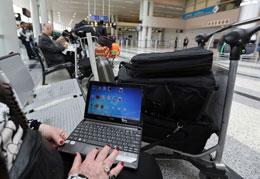Asian airlines worry about US laptop ban

More than 51,000 passengers on 179 flights between Asia and the U.S. every day may be impacted if the Trump administration extends a ban of large electronic devices on flights, according to a report issued this week.
The possible move is adding to the concerns of Asian carriers that are already struggling with higher fuel costs and stiff competition.
One country that sees a silver lining in the situation is the U.S.' northern neighbor, said the report.
If the ban is expanded to Asia but Canada's policy remains unchanged, Air Canada has a "potential benefit," the report said, because business travelers from Asia may choose to fly Air Canada and then transit in a Canadian city before entering the U.S.
The report by Sydney-based aviation think tank CAPA Centre for Aviation, titled "Asian airlines worry about U.S. laptop ban," said transpacific routes are "critical for Asia's largest airlines -- especially those in Northeast Asia."
For many Asian airlines, these routes represent more than 30% of their total international capacity. The rate is even higher, at more than 40%, for Taiwan's Eva Air, Japan Airlines and Korean Air Lines.
Business travelers who often work on laptops during flights would particularly feel the pain. The report showed that United Airlines boasts the largest capacity in first- and business-class cabins on transpacific routes, followed by Korean Air, All Nippon Airways and Japan Airlines in premium class capacity.
For ANA, 24% of its Asia-U.S. capacity is in premium cabins, the highest among 15 carriers serving Asia-U.S. markets. The number for JAL is 21%. With a higher rate of business travelers, the premium classes are where "presumably there is greater demand for electronic device usage," according to the report.
"Demand [for air travel] could taper" if the ban is introduced to Asia, Will Horton, the senior analyst for CAPA warns in the report. "Business travelers may put off travel or become more selective of their airline or routing."
U.S. Homeland Security Secretary John Kelly said in a TV interview on May 28 that the administration is considering extending the laptop ban to all international flights to and from the U.S. Kelly also spoke to European officials about a possible expansion of the ban to Europe. Broadening the ban is being considered based on fears that terrorist groups are acquiring the capability to make a bomb small enough to fit in a laptop or tablet.
In March, the U.S. introduced a laptop ban on flights from 10 Middle Eastern and North African airports including in Saudi Arabia and United Arab Emirates. The CAPA report said the March ban impacted 48 flights and 16,683 passengers daily.
The Financial Post reported that while airline industry groups have raised concerns about the potential expansion of the ban, it could provide a boost for Canadian airlines should the federal government choose not to follow suit when it comes to electronic restrictions on flights.
“This could actually be a very good — but unintended — boost to business for Canadian long-haul airlines,” said Henry Harteveldt, a travel industry analyst and president of the Atmosphere Research Group.
“If this ban is implemented in Europe, expect Air Canada and WestJet to raise their fares from Europe via Canadian gateway (cities) to the United States. Business travellers would flock to those airlines … if they can keep their electronics. You will see these travellers forego their frequent flier miles, if it means they can be more productive.”
Delphine Denis, press secretary for Transport Minister Marc Garneau, said Canada is not considering any new measures at this time and electronic devices such as laptops are still permitted on flights coming in and out of Canada.
“The security and protection for air travellers in Canada is our priority and Canada works closely with our allies to develop approaches that incorporate security priorities and minimize impact on the traveler experience,” Denis said.
“We remain vigilant in continuously assessing our security and we will not hesitate to take action when needed.”






